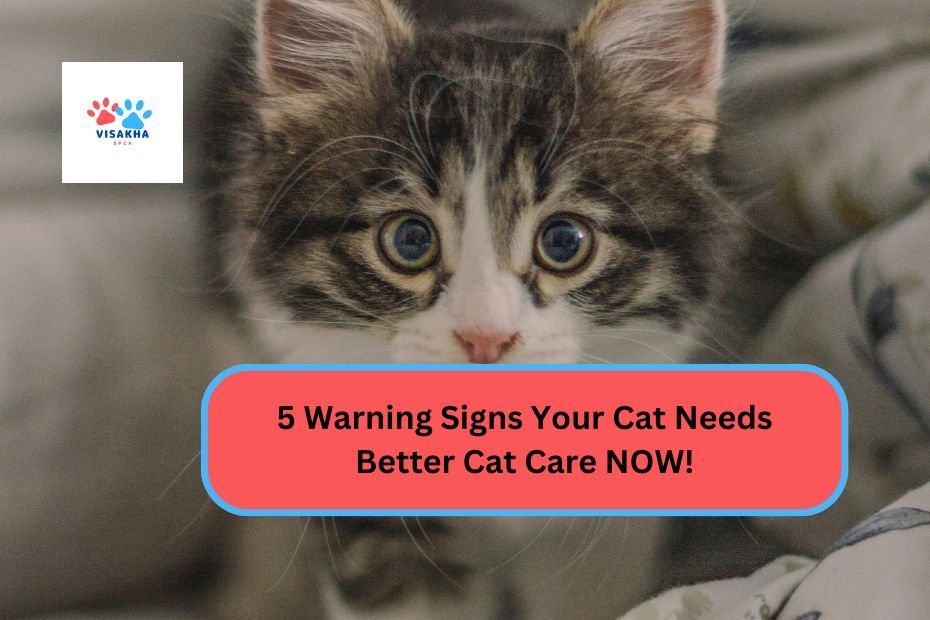As a cat owner, it’s essential to be attentive to your furry friend’s health and well-being. Cats can be masters at hiding their discomfort, making it crucial for you to recognize when something isn’t quite right. Here are five warning signs that indicate your cat may need better care right now, along with tips on how to address these issues.
1. Changes in Appetite
Why It Matters
A sudden increase or decrease in your cat’s appetite can signal underlying health problems. This could be anything from dental issues to more severe conditions like diabetes or kidney disease.
Warning Signs to Look For
- Loss of Appetite: If your cat isn’t eating or drinking as usual, it’s a red flag.
- Increased Hunger: Conversely, if they seem to be eating more than normal without gaining weight, this can also indicate a health issue.
What to Do
Monitor your cat’s eating habits closely. If you notice significant changes lasting more than a day, consult your veterinarian for a check-up. They can help identify any health concerns and recommend dietary adjustments.
2. Lethargy and Reduced Activity
Why It Matters
Cats are naturally curious and playful creatures. If your cat suddenly becomes lethargic or disinterested in activities they once loved, it could be a sign of illness.
Warning Signs to Look For
- Excessive Sleeping: While cats sleep a lot, an increase in sleepiness or refusal to engage in play could be concerning.
- Avoiding Interaction: If your cat is withdrawing from social interaction, it may indicate discomfort or pain.
What to Do
Keep an eye on your cat’s activity levels. If you notice a lack of energy or interest in activities they typically enjoy, schedule a vet appointment to rule out any potential health issues.
3. Changes in Grooming Habits
Why It Matters
Grooming is essential for a cat’s hygiene and comfort. Changes in grooming habits can indicate stress, pain, or illness.
Warning Signs to Look For
- Over-Grooming: Excessive grooming can lead to bald patches and skin irritations, often caused by stress or allergies.
- Neglected Grooming: If your cat stops grooming altogether, it may be due to pain or illness, particularly in older cats.
What to Do
Examine your cat’s coat and skin for any signs of irritation or abnormalities. If you notice changes in grooming habits, consult your veterinarian to determine the underlying cause and appropriate care.
4. Unusual Bathroom Habits
Why It Matters
Changes in litter box habits can reveal a lot about your cat’s health. Issues such as constipation, urinary tract infections, or kidney problems may present themselves through changes in bathroom behavior.
Warning Signs to Look For
- Straining to Urinate or Defecate: This can be painful and may indicate a blockage or serious condition.
- Increased Frequency: Going to the litter box more often than usual, especially if not producing much waste, can signal issues.
What to Do
If you observe any unusual bathroom behaviors, take your cat to the veterinarian immediately. Early intervention can prevent more severe health complications.
5. Behavioral Changes
Why It Matters
Sudden behavioral changes can indicate underlying issues, whether physical or emotional. Stress, illness, or pain can manifest in various ways.
Warning Signs to Look For
- Aggression or Withdrawal: If your usually friendly cat becomes aggressive or hides often, something may be wrong.
- Excessive Vocalization: Changes in the frequency or tone of your cat’s meows can indicate distress or discomfort.
What to Do
Pay attention to your cat’s behavior and note any significant changes. If these changes persist or worsen, seek guidance from your veterinarian or a pet behaviorist to understand and address the root causes.
Conclusion
Being a responsible cat owner involves staying vigilant and responsive to your cat’s needs. Recognizing these warning signs is crucial in ensuring your feline friend receives the care they need. If you observe any of these signs, don’t hesitate to consult your veterinarian. Proactive care can lead to early detection of potential health issues, allowing for more effective treatment and a happier, healthier life for your beloved cat. Remember, your furry companion relies on you to be their advocate, so always prioritize their well-being!

